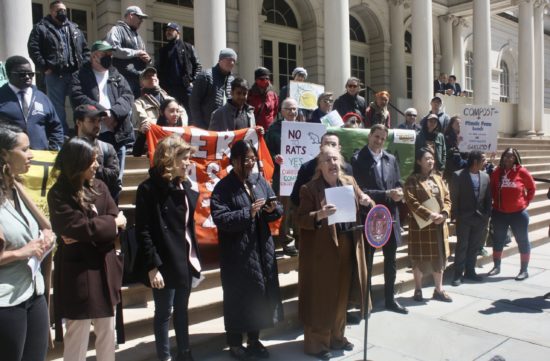
By Daniel Katzive
“The only way to get rid of the rats is to do organics,” City Councilmember Gale Brewer told the crowd at a rally on Thursday at City Hall in support of three sustainability bills being introduced to the Council.
A bill by Council Member Shahana Hanif of Brooklyn calls for a return to citywide curbside collection of organic material. The other bills being introduced require the city to set up three sites per borough for the recycling of electronic and organic waste, and to mandate that the city to meet its goal of sending no more waste to landfills by 2030.
“Gale is adamant about the need for universal organic curbside pickup and plans to be a co-sponsor of the bill,” Edward Amador, her communications director told WSR. In a follow up email he cited studies indicating, if the city could divert organic waste from landfills at the same rate as recyclables — around 15% — the cost of collecting and processing organics would come into line with the overall costs of managing waste in the city. Supporters of the bill at City Hall also stressed this point: reducing the volume of organic waste reaching landfills is key to meeting the city’s climate goals for reduced greenhouse gas emissions.
The city’s curbside organics recycling program was eliminated during the pandemic and has currently only resumed in select districts and on an opt-in basis. Residents (or building managers) in seven of the city’s 59 Community Board districts, including CB7 on the Upper West Side, can request a brown organics collection bin from the Sanitation Department (DSNY), which is picked up on collection days.
There are also food scrap drop-off sites across the city, including several at the various weekly greenmarkets throughout the UWS. DSNY told WSR that organics collected in Manhattan are currently brought to the Department of Environmental Protection’s (DEP) anaerobic digester in Brooklyn, but at other times, organics could also be brought to DSNY’s Staten Island compost facility and similar facilities elsewhere. The DEP’s digesters can help convert organic waste and sewage to biogas and to fertilizer products.
According to DSNY records, CB 7 averaged 3.0 tons per day of organics collected in February, 2022. This made it the second highest contributor of organics in Manhattan that month, behind only District 3 on the Lower East Side. This is still 15% below the levels of organics collected in February 2020, before the pandemic. District 6 in Brooklyn had the highest numbers in the city in February 2022, but was also running well below February 2020 rates.
The proposed sustainability bills are supported by at least eight of the City Council’s 51 members who attended the rally. The Mayor, however, may have different views on how far to expand organics collection just now, given fiscal constraints. According to DSNY spokesman Vincent Gragnani “the mayor’s Executive Budget includes funding to continue existing curbside composting services and expand those services within the Community Boards already receiving service.”
Gragnani notes “The budget will continue to fund food-scrap drop-off sites, and will add funding for 100 ‘smart’ bins across the city that can be accessed with a key or app 24/7. It will also expand organics collections over the next two year to include all Department of Education schools in the city (currently roughly half the schools participate).”
In contrast, Brewer insists the city needs “100% organic collection at the curbside now”. Brewer told the rally Thursday, “There is no downside, none, to universal mandated absolutely today composting at the curbside.”








“There is no downside, none, to universal mandated absolutely today composting at the curbside.”
There is one downside; A huge number of people won’t do it. And because in apartment buildings their garbage gets mingled with the garbage of 100 others, it can’t be enforced.
You want your building porters to go through everyone’s garbage to sort compostables?
Or to fine the violator in apartment 7B?
Brewer is fooling nobody but herself.
Downside it’s having a building employee check every floor every 8 hours 24/7. So there will be a very large cost to each building
Nothing is more of a buzzkill than a dose of cold-blooded pragmatism.
The thing the city needs is more cops and more holding of criminals. Also, picking up garbage more frequently.
How do these utopian ideas even get through?
Nobody wants rats, everyone understands that organic garbage is a rat feed, but to come up with this totally unrealistic idea and pitch it shows how out of touch our official are.
For now we just have to make sure the garbage is not sitting on the street sidewalks.
Gale Brewer has her good points, but lately with her priorities and proposed solutions are way off. Like this, dark stores, etc.
The level of laziness & sheer intransigence about organic waste collection in NYC is spectacular.
Look at existing cities where mandated curbside organic collection has been put in (pretty much the whole Bay Area has had it for years, California has a statewide mandate now, Seattle, etc). It works. People participate. Those cities have far fewer vermin complaints than NYC (SF is still pretty gritty for those of you who don’t get out much).
Just do it. If you make it easy and practical, people will use the bins. And your street might not smell like a sewer every Thursday during the warmer months.
The streets of SanFran resemble those of Third World countries.
A garbage disposal under your sink, which is now legal after decades of being banned in NYC, will get rid of your organic waste just fine. DEP sewage treatment plants use anaerobic digestion, including at North River where UWS liquid waste goes to. You might lose some when it rains but it would be more effective than trying to mandate curbside collection. I’ll gladly vote against any pol who wants to force that on us.
This ain’t never gonna work! Who has the time to sort trash and run out to the curb every time you have food waste? And where are you supposed to store it your apartments? Most are not equipped for food waste storage and my fridge is full. And how are they going to enforce this, especially in large apartment buildings? Plus there hasn’t been any intelligent, user-friendly rollout. Meanwhile, I see people throwing all kinds of trash in those recycling food bins because no one knows what the hell goes in them. Hey, it’s hard enough to get the public to pick up dog poop on the sidewalks. Lotsa luck with that.
“The only way to get rid of the rats is to do organics,”. IMO, the only two interpretations are either Ms Brewer is factually challenged or is cynically pandering to a fact-free constituency. I’m 64. When I was a boy, all NYC organic garbage had to be put out in tightly closed metal garbage coins to keep out rats. It worked. As would a 1000 other things. I’m pretty progressive and IMO sending out hugs diesel burning trucks that cost us >$100/hour to run to massage some vague notion of environmental guilt is just loony, not even considering that citywide, maybe 5-10% of residents, if that, will comply.
whatever happened to those metal cans? Bring them back!
Both. That’s her MO for decades.
Actually no, we will not get rid of rats by “going organic.” Rats are the only mammals able to a nuclear attack and the next generation will adapt and thrive with off the charts radiation.
The only way to to get rid of rats is to shut down ALL food-related places, from factories to street vendors.
Gale Brewer just might suggest it. Wouldn’t put it past her. She’s exhausting.
I agree with Brewer! I was shocked that the curbside was allowing so much non-organic stuff to be collected. This is not good!
Just my personal experience: Separating food waste has been great. No smelly garbage and I use only 1 plastic trash bag a week for everything else (so fewer plastic bags, too!). I keep the food waste in a covered plastic container and if I need a second, I put the first container in the fridge until weekly dropoff. I thought it would be hard in the city, but it’s not and has improved my quality of life.
People in my building can’t get recycling right. You want me to trust them with composting?
I think this is a good idea. However, a lot of the rat problem are the due to the garbage cans on each corner. They keep the city clean, but also feed the rats. We need to address that issue.
Here we go again, laying the responsibility of climate change at the hands of the regular households? What about restaurants, hospitals, schools, large companies, and state and federal buildings? Do they compost? Is there a mandate for them? That would be the first step, the first step that can actually make a difference. Once that’s in the works, then extending it to apartment buildings and homes would make more sense.
They do compost.
“New Yorkers NEED 100% organic collection at the curbside now”
Look at existing cities where mandated curbside organic collection has been put in (pretty much the whole Bay Area has had it for years, California has a statewide mandate now, Seattle, etc). It works. People participate. Those cities have far fewer vermin complaints than NYC
If composting became law for all buildings, it would be an enormous help in our discouraging battle with the rats. They are presently feasting overnight in the plastic garbage bags put out on the curbs with all sorts of organic delights mixed within.
We have organics composting in our building. Our super is a big fan. Rats cannot get into the bins and are less attracted to the big bags of garbage because they do not contain food scraps. Far few large bags of garbage are produced by our building. Think of it as separating wet organic waste from other kinds of waste. It is easy to do, and if your container allows air, it does not smell unless your food was already rotten going in. I was repelled at the idea initially and now I think it is fantastic. People in other municipalities are composting their organic waste – are we really less smart and able than those people? Give it a try. You may really like it.
Anybody else remember the ridicule and scorn that accompanied the introduction of pooper scooper laws? And guess what? The p-s laws went through and we are all the better for them. And yes, probably 5 or 10 % of people ignore them. That’s life, one big bell curve of humanity, some people more responsible; some, less. But can we please stop pandering to the laziest, most cynical and least responsible among us? My building composts, it takes less than a minute a week to set up and dispose of the separate compostable materials. Change comes slowly, but it’s worth it. Again, it takes us one minute a week to be compliant, it’s not a big deal.
My building collects organics and it works out fine. The brown bins aren’t next to the others, so those few who can’t be bothered to separate out organics, also can’t seem to be bothered to walk a little farther to get to the brown bins. Just wish the pick up was more than once a week.
I highly recommend reusing those plastic boxes that salad leaves come in to store your food waste in the freezer. I fill up 3-4 boxes per week and take them to one of the greenmarket drop-offs. Because they’re frozen, they don’t smell or make a mess, even if I have to take the subway.
But I’d welcome more curbside options.
Did Gale propose that composting would be mandatory at this time or is the idea to have composting available in all now. ?Sounds like the people criticizing the curbside compost program are misinformed. By putting compost in the heavy duty brown bins, which deter rats, the garbage is no longer in the big black garbage bags which rats can chew though in a minute. The trash in your apartment is no longer leaky. and smelly. People in my building with Curbside use quart containers ( yogurt ) coffee cans, , take it to basement where we recycle, or store it termorarily in freezer , fridge, or purchased compost containers kept briefly on kitchen counter .. WE can feel good that vegetable scraps , leftovers AND animal products, soggy paper towels are not wasted and producing methane in the landfill. More and more residents are taking advantage of the curbside composting program in our building and on our block. WE love it.
Not all paper towels are compostable just because they’re soggy.
It works, it’s easy. The bins were kept in our basement next to the trash, and everyone followed the rules. And if not, so what, 90% of compostable stuff went into the brown bins.
When it ended, the rat problem went sky high.
I too remember the scorn and skepticism toward the pooper scooper laws, and more recently against the plastic bag laws. But people adjusted and realized they made sense. Most of the doubters here don’t seem to know how residential composting works. It’s not that hard, people! You figure out the logistics, and there is lots of how-to information online. Everyone I know who has tried it starts to love doing it for all the benefits.
I read several of the comments and I’m surprised at their total misunderstanding of such a program. We have had composting in our building for several years now, after convincing out Boardof Directors that would be cost effective, and would LOWER the risk of rats getting into the black plastic bags that such waste was historically used by our building.
When the city stopped funding composting our BOD actually went out to find a private company that we could pay so we could continue composting. When the city started funding pick-ups again and were found to be too short staffed to reliably collect the full bins when they said they would, our BOD went back to the private vendor.
Now, as far as anyone being forced to compost, it just aint so! Those residents that wish to compost do, and those who either can’t bring their compostable food items to the bins, that relocated outside our building, or just don’t want to compost, DON’T! No-one checks on them, and no-one tries to make them feel guilty about their not composting.
All this’ll is trying to do is to make composting universally possible for all New Yorkers who wish to compost.
Black bags, hiding who knows what are the worst….rats have t he intelligence to know when bags are on the curb – many filled with organic waste and food scraps which should be sent to the composting site . We have a brown which is filled every week. If CB7 creates 3 tons, imagine what the rest of the city is sending to trash and landfill in other states when it should be composted. Maybe there should be a new design in collection trucks to enable them to handle separately ‘trash’; paper; plastic/metal and organics.
Brewer is 100% correct. Collecting organics will reduce rats, and won’t be costly once scale is achieved.
As to comments suggesting participation will never get there, it’s also true we’ll never fully eliminate littering or assault or any other crime. But the best way to address them is to have laws against them that are enforced. “Should we fine the person who doesn’t compost in Apartment 7B?” Hell, yes!
Amazed for a community that has so much skepticism about unenforced laws in other parts of our community, there’s a laziness about taking that one when it comes to putting banana peels in a different bag.
Fact check: the proposed legislation calls for three waste drop-off sites per community district, not per borough. See: https://legistar.council.nyc.gov/LegislationDetail.aspx?ID=5570508&GUID=B7D2702B-9AC2-4076-B564-D341FB1EB1BE&Options=ID%7cText%7c&Search=
We’ve been doing the organic brown bins for a couple of years (except COVID) and it’s proved to be quite easy, no-hassle, with one surprising collateral benefit, the bulkier main trash has to be carried out about 1/4 as much as before – no smells.
We love the organics collection in our 13-story, 110 unit bldg on UES so much, we PAID ourselves for a private carter to continue pick ups when DSNY suspended. Brewer is right: black bags split and leak — they are what attracts the rats, not the enclosed containers (that also roll, BTW, sparing our bldg workers from carrying heavy bags!) Many plusses here!
Black trash bags are NYC luggage piece.
Too bad each community district isn’t connected to a park directly on the proposed sustainability bills. It would make a difference to everyday people to be able to say that by compositing in my building a tree grows taller in Central Park. Then maybe folks could also visit the trees.